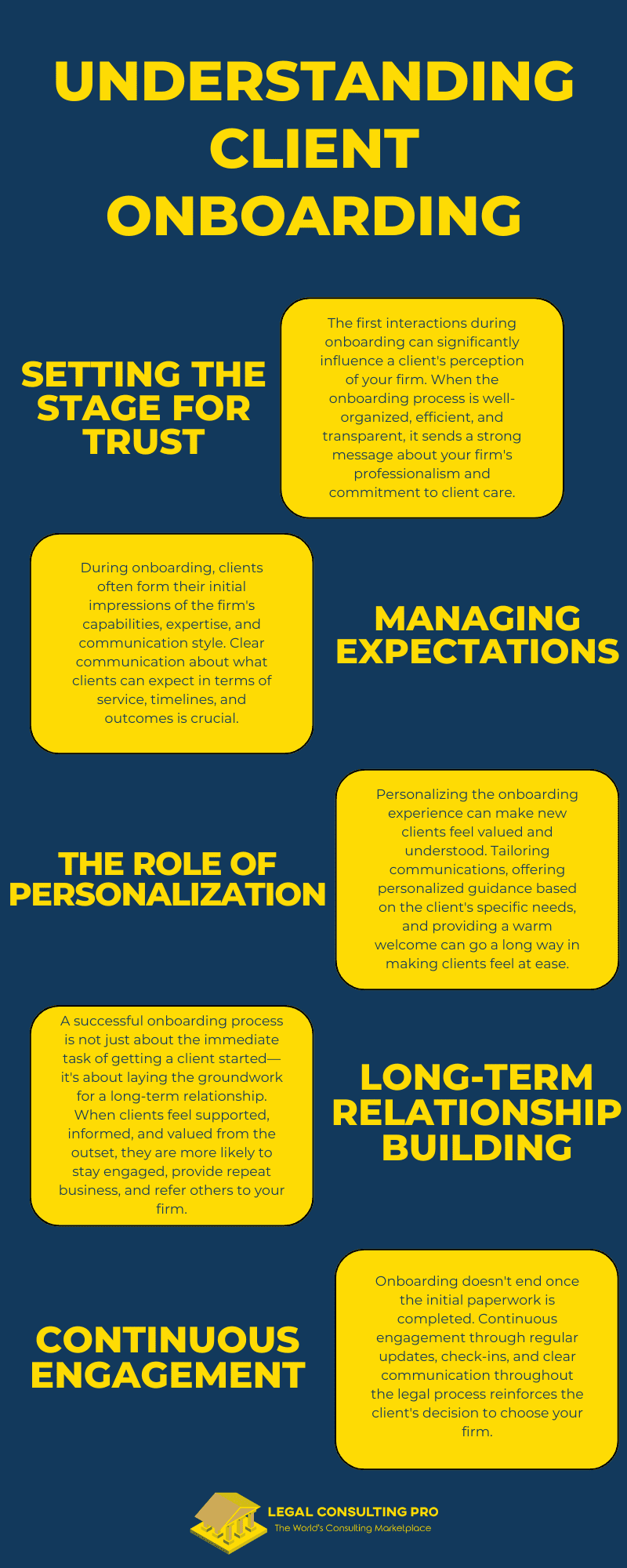In today’s digital age, the first impression a client gets of your law firm often isn’t from a face-to-face meeting or a phone call—it’s from their online interactions, especially during the client onboarding process. Efficient and accurate legal data entry is crucial in creating a positive initial experience for clients. This article delves into the significance of streamlined legal data entry and how litigation support services play a pivotal role in optimizing client onboarding.
Understanding Client Onboarding
Client onboarding is a multifaceted process that goes beyond mere administrative tasks. It’s the initial interaction where new clients transition from potential prospects to valued members of your law firm’s community. This phase serves as a critical juncture, laying the foundation for the entire client-lawyer relationship.
Setting the Stage for Trust
The first interactions during onboarding can significantly influence a client’s perception of your firm. When the onboarding process is well-organized, efficient, and transparent, it sends a strong message about your firm’s professionalism and commitment to client care. Conversely, a disjointed or confusing onboarding experience can raise red flags and erode trust before the relationship even begins.
Managing Expectations
During onboarding, clients often form their initial impressions of the firm’s capabilities, expertise, and communication style. Clear communication about what clients can expect in terms of service, timelines, and outcomes is crucial. Setting realistic expectations from the outset helps build trust and ensures that clients have a clear understanding of the legal process ahead.
The Role of Personalization
Personalizing the onboarding experience can make new clients feel valued and understood. Tailoring communications, offering personalized guidance based on the client’s specific needs, and providing a warm welcome can go a long way in making clients feel at ease. It demonstrates that your firm values them as individuals, not just as another case or file.
Long-term Relationship Building
A successful onboarding process is not just about the immediate task of getting a client started—it’s about laying the groundwork for a long-term relationship. When clients feel supported, informed, and valued from the outset, they are more likely to stay engaged, provide repeat business, and refer others to your firm.
Continuous Engagement
Onboarding doesn’t end once the initial paperwork is completed. Continuous engagement through regular updates, check-ins, and clear communication throughout the legal process reinforces the client’s decision to choose your firm. It demonstrates ongoing commitment and fosters a collaborative relationship built on trust and mutual respect.

The Role of Legal Data Entry
Accuracy and Efficiency
Data Integrity:
- Accurate Input: Legal data entry ensures that client details, including personal information, contact details, and case specifics, are recorded correctly. This accuracy is crucial for ensuring that all communications and interactions with the client are based on correct and up-to-date information.
- Error Reduction: Efficient data entry processes minimize the risk of errors or discrepancies that can lead to misunderstandings or complications later on. It ensures that the firm has a reliable database to work from, enhancing the overall efficiency of client management.
Foundational Information for Legal Proceedings
Case Relevance:
- Detailed Case Information: Legal data entry captures the specifics of each case, including legal issues, key dates, parties involved, and relevant documentation. This information is essential for developing a tailored legal strategy and managing the case effectively.
- Document Management: Inputting details related to case documents, evidence, and correspondence ensures that all relevant materials are easily accessible when needed. It streamlines document retrieval and review processes, saving time and effort.
Enhancing Client Communication and Engagement
Personalized Client Interactions:
- Client Profiles: Creating comprehensive client profiles through legal data entry enables personalized communication and service delivery. It allows the firm to understand the client’s needs, preferences, and expectations better.
- Communication Logs: Maintaining records of client communications, meetings, and updates ensures continuity and consistency in client interactions. It helps in tracking the progress of the case and keeping the client informed at all stages.
Compliance and Security
Regulatory Adherence:
- Legal Compliance: Accurate data entry ensures that the firm remains compliant with legal and regulatory requirements related to client information handling and data protection.
- Data Security: Implementing robust data entry protocols and security measures safeguards client information against unauthorized access, breaches, or misuse. It protects client confidentiality and upholds the firm’s reputation for trustworthiness.
Streamlining Administrative Processes
Workflow Efficiency:
- Task Allocation: Legal data entry helps in assigning tasks, deadlines, and responsibilities to specific team members, ensuring smooth workflow management.
- Resource Allocation: Having a well-maintained database through legal data entry assists in resource planning, helping the firm allocate staff, time, and resources more effectively based on client needs and case requirements.
The Role of Litigation Support Services
Litigation support services play an invaluable role in optimizing legal data entry processes, especially during client onboarding. Their expertise and specialized tools can make a world of difference in ensuring accuracy, efficiency, and compliance.
Expertise in Action
With their deep understanding of legal requirements and best practices, litigation support services professionals can help streamline the data entry process. They can identify and correct errors, verify the accuracy of information, and ensure compliance with regulatory standards.
Technology as a Tool
Advanced litigation support services leverage cutting-edge technologies to automate and optimize legal data entry. Features like data validation, batch processing, and AI-powered data extraction can significantly enhance efficiency and accuracy.
Compliance and Security
Ensuring compliance with legal and regulatory standards is non-negotiable. Litigation support services help law firms navigate the complexities of data protection laws, such as GDPR or HIPAA, safeguarding client information and maintaining trust.
Best Practices for Streamlined Client Onboarding
Optimizing client onboarding through streamlined legal data entry involves adopting best practices and leveraging the right resources.
- Centralized Data Management: Maintain a centralized database or case management system to store all client-related information. This ensures easy access, reduces redundancy, and facilitates efficient data retrieval.
- Automate Where Possible: Use automation tools to handle routine data entry tasks. This not only speeds up the process but also minimizes the risk of human error.
- Regular Audits and Reviews: Conduct regular audits to verify the accuracy and completeness of client data. Address any discrepancies promptly to maintain data integrity.
- Continuous Training: Invest in training programs to keep your team updated on the latest legal data entry best practices and technologies.
- Partner with Experts: Consider partnering with litigation support services to leverage their expertise and resources. Their specialized knowledge can help you navigate complex legal data entry tasks with ease.
Conclusion
The first impression is indeed digital in today’s interconnected world. Optimizing client onboarding with streamlined legal data entry is not just a good practice—it’s a necessity. By focusing on accuracy, efficiency, and compliance, and leveraging the expertise of litigation support services, law firms can create a positive onboarding experience that sets the stage for long-term client relationships and success.
Similar blogs:
Legal Data Entry: Beyond Textboxes: The Rise of AI-Powered Data Entry in Legal Documents













































